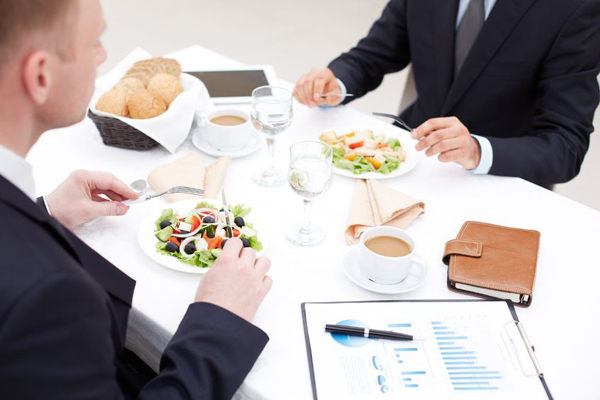Whether you’re grabbing a quick lunch with colleagues or need to impress a client at a formal dinner, maintaining a professional image is important. However, dining in a business setting can sometimes be tricky. Never fear! Here’s a refresher of business dining etiquette tips to help you mind your manners and make a good impression at your next business meal:

1) Before the meal, shake hands with anyone already sitting at the table. If necessary, introduce yourself. Be sure to remain standing until your host sits. Once you sit down, place your napkin on your lap only after everyone else is seated and your host has moved his or her napkin. If someone arrives to the table after you do, it’s polite to stand up to greet them.
2) When the waiter approaches the table, don’t ask him to explain everything on the menu (one or two items are okay, especially if you have a food allergy or a dietary restriction such as a gluten intolerance and need clarification on a dish). If you appear too picky or indecisive, your peers may become annoyed.
3) Follow your host’s lead – if they’re first in line to order, choose something similar to what they order. For example, if they opt for a salad, try not to go for the prime rib. If the host isn’t first in line to order, then ask for his/her recommendation. And of course, don’t order the most expensive thing on the menu.
Pro Tip: Order foods that are easy to eat, such as chicken, fish or salads. Avoid dishes with a messy reputation such as spaghetti or a greasy burger (as hard as that may be to resist!).
4) As mentioned above, it’s best to follow your host’s lead when it comes to ordering an alcoholic beverage. If you choose to drink, limit yourself to one beer or glass of wine.
5) Drink from your own water glass and don’t make the mistake of taking from your colleague or client’s bread plate. Remember that your beverage will always be placed on the right side, above your knife and soup spoon, and your bread plate will always be placed on the left side, above your fork(s).
6) Try a little of everything on your plate unless you have a food allergy. You could come across as unsophisticated (and juvenile) if you eat only your steak and potatoes and ignore your veggies. If the food served is not to your liking, it is polite to at least attempt to eat a small amount of it. Additionally, don’t over indulge or ask to finish anyone else’s food.
7) Cut only enough food for the next mouthful (cut no more than a few bites of food at a time). Eat in small bites and slowly. Do not “play with” your food or utensils. Never wave or point silverware, and do not hold food on your fork or spoon while talking.
8) Avoid talking about religion, politics and other controversial topics. If someone else brings up an issue you’re uncomfortable with during the meal, politely try to change the subject as subtly as possible.
9) If you need to leave the table during the meal, place your napkin on your chair and push the chair back under the table. There is no need to announce where you are going, or what you will be doing when you get there.
10) A cough or a sneeze should be directed into your left shoulder, shielded by your left hand, keeping your right hand germ free. Avoid using your napkin as a tissue. Speaking of germs: if you drop your fork on the floor, leave it there! It’s not necessary to dive under the table to fetch it. Simply ask your server for a new utensil and encourage the rest of your group to continue eating.
11) Your mother’s request when you were a kid works here, too: keep your elbows off the table! It’s also courteous to never talk with food in your mouth.
12) Once you have finished your meal, signal your server to clear your place setting by resting your fork (tines up) and knife blade inward, with the handles resting at five o’clock and the tips pointing to ten o’clock on your plate. If you’re unable to finish your meal, it’s considered unprofessional to take home leftovers.
13) Don’t argue over the check or offer to pay the tip; the host who invited you must take care of both. Be sure to kindly thank your host for the meal; shake hands before you leave and maintain good eye contact. Helpful hint: If you’re hosting the dinner and a guest offers to pay the bill, politely decline.
A business lunch or dinner is a great opportunity to let your professionalism shine – whether you’re going to a local steakhouse or dining abroad. While business dining etiquette rules can vary country to country, the general guidelines remain the same: practice good manners and use common sense. For more advice on making a good impression while dining internationally, including more tips on tipping, check out our post Business Etiquette Abroad: How to Avoid Culture Shock When Traveling.
Safe Travels!


